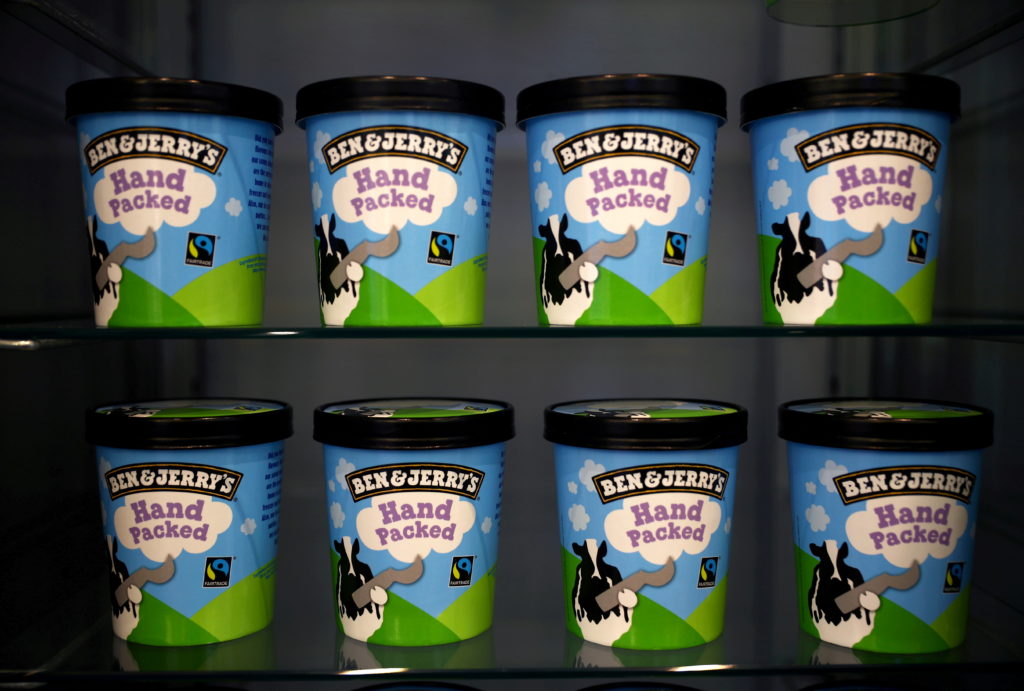
MONTPELIER, Vt. (AP) — Ben & Jerry’s said Monday it was going to stop selling its ice cream in the Israeli-occupied West Bank and contested east Jerusalem, saying the sales in the territories sought by the Palestinians are “inconsistent with our values.”
The announcement was one of the strongest and highest-profile rebukes by a well-known company of Israel’s policy of settling its citizens on war-won lands. The settlements are widely seen by the international community as illegal and obstacles to peace.
In a statement posted on the company’s website, the Vermont-based ice cream maker says it recognizes “the concerns shared with us by our fans and trusted partners.”
“We have a longstanding partnership with our licensee, who manufactures Ben & Jerry’s ice cream in Israel and distributes it in the region,” the statement said. “We have been working to change this, and so we have informed our licensee that we will not renew the license agreement when it expires at the end of next year.”
The statement did not explicitly identify the concerns raised, but last month, a group called Vermonters for Justice in Palestine called on Ben & Jerry’s to “end complicity in Israel’s occupation and abuses of Palestinian human rights.”
“How much longer will Ben & Jerry’s permit its Israeli-manufactured ice cream to be sold in Jewish-only settlements while Palestinian land is being confiscated, Palestinian homes are being destroyed, and Palestinian families in neighborhoods like Sheik Jarrah are facing eviction to make way for Jewish settlers?” the organization’s Ian Stokes said in a June 10 news release. The organization didn’t immediately respond to an emailed request for comment.
Founded in Vermont in 1978, but currently owned by consumer goods conglomerate Unilever, Ben & Jerry’s has not shied away from social causes. While many businesses tread lightly in politics for fear of alienating customers, the ice cream maker has taken the opposite approach, often espousing progressive causes.
Ben & Jerry’s took a stand against what it called the Trump administration’s regressive policies by rebranding one of its flavors Pecan Resist in 2018, ahead of midterm elections.
The company said Pecan Resist celebrated activists who were resisting oppression, harmful environmental practices and injustice. As part of the campaign, Ben & Jerry’s said it was giving $25,000 each to four activist entities.
Aida Touma-Sliman, an Israeli lawmaker with the Joint List of Arab parties, wrote on Twitter that Ben and Jerry’s decision Monday was “appropriate and moral.” She added that the “occupied territories are not part of Israel” and that the move is an important step to help pressure the Israeli government to end the occupation.
The West Bank and east Jerusalem were captured by Israel in the 1967 Mideast war. Some 700,000 Israeli settlers now live in the two territories — roughly 500,000 in the occupied West Bank and 200,000 in east Jerusalem.
Israel treats the two areas separately, considering east Jerusalem as part of its capital. Meanwhile, Israel considers the West Bank as disputed territory whose fate should be resolved in negotiations. However the international community considers both areas to be occupied territory. The Palestinians seek the West Bank as part of a future independent state, with east Jerusalem as their capital.
While Ben & Jerry’s products will not be sold in the settlements, the company will stay in Israel through a different arrangement.
The Yesha Council, an umbrella group representing the roughly 500,000 Israelis living in West Bank settlements, said “there’s no need to buy products from companies that boycott hundreds of thousands of Israeli citizens because of the place they choose to live.” It said Ben & Jerry’s decision “brought a bad spirit to such a sweet industry” and called on Israelis to buy locally produced ice cream this summer.
Israel’s Foreign Minister Yair Lapid called the decision “a shameful capitulation to antisemitism, BDS and everything bad in the anti-Israel and anti-Jewish discourse.” He said he is going to take the issue to the more than 30 states that have legislation against the anti-Israel boycott movement.
BDS is shorthand for a grassroots, Palestinian-led movement that advocates boycotts, divestment and sanctions against Israeli institutions and businesses. The BDS movement compares itself to the anti-apartheid movement targeting South Africa in the 20th century, and its nonviolent message has resonated with progressives around the world. But Israel says the movement masks a deeper aim of delegitimizing or even destroying the entire country.
For its part, the BDS movement applauded Ben & Jerry’s decision as “a decisive step towards ending the company’s complicity in Israel’s occupation and violations of Palestinian rights,” but called upon the company to do more.
“We hope that Ben & Jerry’s has understood that, in harmony with its social justice commitments, there can be no business as usual with apartheid Israel,” a statement read.
Associated Press reporters Lisa Rathke in Marshfield, Vermont, and Ilan Ben Zion and Josef Federman in Jerusalem contributed to this report.
ncG1vNJzZmivp6x7sa7SZ6arn1%2Bjsri%2Fx6isq2eVmLyvu8yyZpudnmK3pr7RsqpmrJ9iwLW7z2aqmqSVqHqquoywnKysXZeur7eMnpisrF2fsrPB0pqjnqU%3D